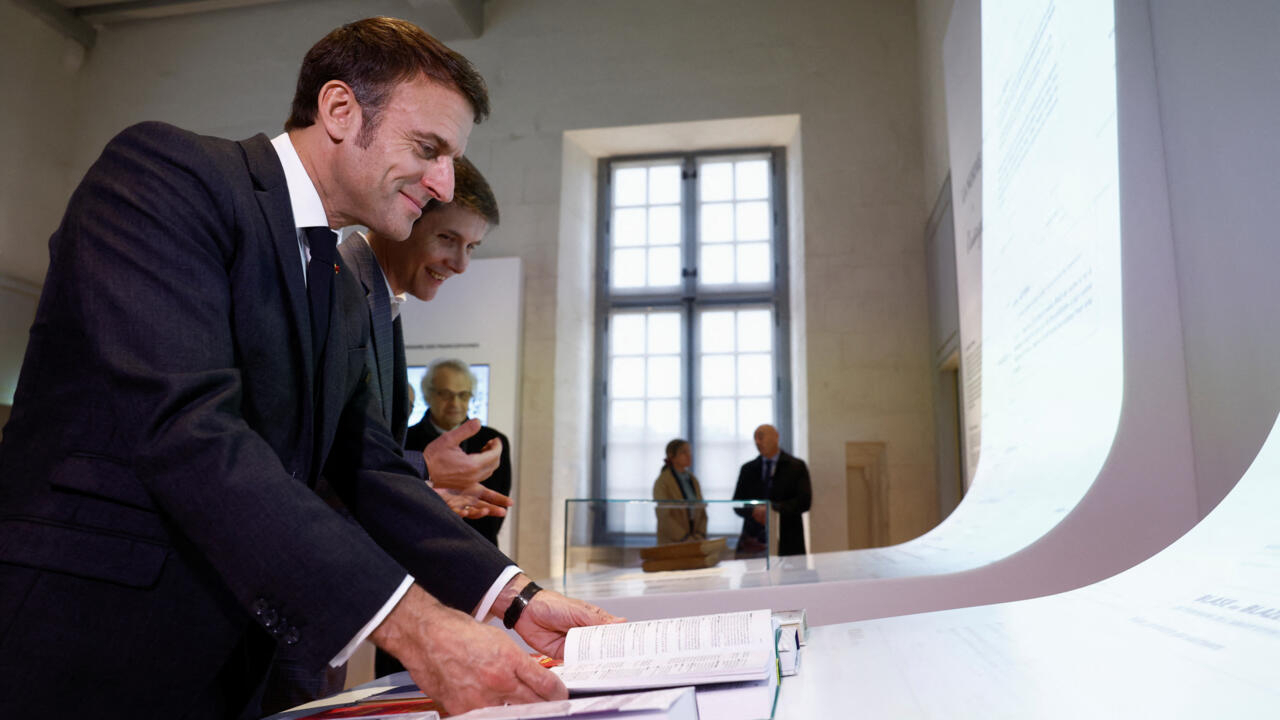French President Emmanuel Macron looked to cement his legacy, and take on political opponents, with the inauguration on Monday of a monument to the French language deep in far-right heartland.
Macron used the occasion to wade into a culture war debate, backing a right-wing bill to ban the use of “inclusive language” – a popular trend for using both masculine and feminine versions of words when writing.
France must “not give in to fashionable trends,” he said as he inaugurated the Cite Internationale de la Langue Francaise just hours before the Senate was due to debate the proposed law.
Modern French presidents love a cultural “grand projet” – an imposing monument to “scratch” their name on history, as ex-leader Francois Mitterrand put it in the 1980s.
Mitterrand was an avid and controversial legacy-builder, transforming the Louvre museum with a glass pyramid, and erecting the vast Opera Bastille and National Library.
Georges Pompidou built a famous modern art museum in Paris, and Jacques Chirac created the Quai Branly global culture museum on the banks of the Seine.
The practice fell out of fashion this century, but has been revived by Macron, who was already eyeing up a crumbling chateau in the small town of Villers-Cotterets while still a presidential candidate in 2017.
He has overseen the renovation of the Renaissance castle, completed in 1539 under King Francois I, and its transformation into an international centre for the French language.
It hopes to attract 200,000 visitors a year to its large library (replete with AI-supported suggestion engine), interactive exhibits and cultural events.
Perhaps fittingly, the website seems determinedly uninterested in the quality of its English translations, describing the castle as a “high place of the French history and architecture”.
Right wingers are so fucking dumb
Tribalists are even worse.
“Language museum,” sounds like some shit Quebec would make
Edit: lol offended Quebecaggot.
Etymology is fascinating and your lack of imagination as to why is preventing you from enjoying (or letting people enjoy) things.
This is the country that gave us existential and post-structural philosophy. What kind of culture war bullshit is going down in France right now?
Just curious: how do they manage with their spelling and their phonetics to achieve gender neutrality?
In the article they refer to just
a popular trend for using both masculine and feminine versions of words when writing
which would be as common sense as every speach beginning with the “ladies and gentlemen” clause. Are they going to remove the “ladies” part because it’s redundant?
The issue, I’d assume, is that you end up replacing generic masculine words with two words. ‘Dear bakers and female-bakers’ for example. When the more logical approach is to simply turn the generic masculine into the generic it’s being used as anyway. In English, for example, a fireman or policeman does not need to be male, and it suffices to say ‘he is a fireman, she is a fireman’.
When the more logical approach is to simply turn the generic masculine into the generic it’s being used as anyway.
That’s still causing the issue of “man as the default,” now it’s just “we consider women men too.” The more logical way would be to use language akin to “firefighter,” “officer,” or “pig,” all naturally neutral words.
Latin derived languages can’t simply use “words like officer, firefighter” to solve the problem because all nouns are gendered, including those not related to living beings at all. You could create a gender-neutral title, but it would still be masculine or feminine in a sentence.
Yeah, well, “they” was exclusively a plural pronoun in English until some people started using it in the singular as a gender-neutral pronoun, and everyone eventually got over it. Well, most everyone.
Languages evolve. I realize this example isn’t as complicated as what is required for using gender-inclusive language in a romance language, but my point remains valid.
“They” as a gender neutral singular pronoun is not a new phenomenon.
But you’re still not understanding my point - I’m not saying people can’t adapt or that language never changes. I’m talking about how the entire grammatical structure of a sentence in Latin languages will force a gender - there’s no way to avoid it. You’d have to modify pretty much all classes of words in order to achieve gender neutrality (apart from masculine neutral) and even then, it would have some irregular ambiguities. This type of change doesn’t happen - you can’t wave your prescriptivism wand and suddenly make everyone change 80% of the words on their vocabulary.
Different language, but I’ve seen some interesting experimental Latine gender neutral verbage. Instead of a/o they just use e.
It definitely requires a fundamental change to language, though, and I don’t know if it can ever take off. Maybe as its own dialect?
It absolutely can be integrated into the language, it will just sound “weird” for a bit, as it’s taking advantage of an underused, but already existing, part of the language.
deleted by creator
Another option is like in German where you invent some sort of new suffix like “*in”. For example, Lehrer (m), Lerhrerin (w), Lehrer*in (m/w/d). Prounounced as a sort of shorter than space silence.
That’s a terrible solution, there’s no pronouns and articles that could refer back to that kind of construct (“The teachers who went to the bridge met their students there”), and don’t get me started on cases or adjective agreement.
If you don’t want to use generic feminine/masculine forms (Like “Die Person löste ein Bahnticket”, “Der Bäcker buk ein Brot”) there’s the Inklusivum, which is nothing but a whole new fourth grammatical gender: Animated but sex-neutral.
deleted by creator
Removed by mod
Instead of saying motivés/motivées for masculine and feminine
motivé·e·s
No.
The French have started using new typographic conventions to turn nouns and adjectives neutral, or at least dual-gendered. French is a deeply gendered language by default, so for instance the word for author is “auteur” if the author is male and “autrice” if the author is female. If unknown, then… The author is assumed male.
This is of course not great, and so the French people have started using constructions like “auteur.ice” or somesuch in order to include both options in the word. This approach appears to have become reasonably popular.
The French right wing is EXTREMELY upset about this and is seeking to get it outright banned (they may already have succeeded actually).
As far as I understand this museum is the brainchild of the fascist party RN and is entirely about the French language as the right wing thinks it should be spoken, as opposed to how it actually is. So, just yet another instance of taxpayer-funded reactionary crap.
Yikes.
Talk about a slippery slope.
Macron is a clown and his opinions on language don’t matter.
With that out of the way, grammatical gender in French is a really complex topic.
“Inclusive” language is centuries old through the usage of parenthesis or slashes. Somewhat recently, attempts have been made to codify this practice using a new syntax (auteur·ice), which conservatives aren’t on board with (either because they don’t want change, or because they can pretend it’s a new cultural import from the US and wage some invented culture war).
Progressives aren’t universally on board either. The new syntax is quite clunky, doesn’t translate to spoken speech, is quite inaccessible to dyslexic people, and completely exclusive of genders outside the binary.This is all complicated by the fact that French is a very rigid language whose rules are practically set by the “French Academy” (which is a whole other can of conservative worms) which unfortunately gives old curmudgeons immense power to strike down any evolution of the language as “officially improper”. Imagine if the Oxford Style Guide or whatever was uniformly taught throughout the English speaking world, and from Mumbai to London to Auckland any step away from these rules at school would get you points deducted, and all administrations were forced by law to follow these rules. Then imagine that it’d been that way for longer than anyone’s been alive. That’s the world the French live in, and the very concept of written language being “alive” is fundamentally something most people either disagree with outright or at least look at with suspicion or a vague look of incomprehension.
The Anglosphere
 The French left.
The French left.“Tables don’t have genders, you dumbasses.”
Also literally everyone who speaks a “gendered” language. Fireman isn’t gendered term you dumbass.
Why would french embrace american stupidity?
It’s a fad that will pass with time.
Ciscolonialism.









